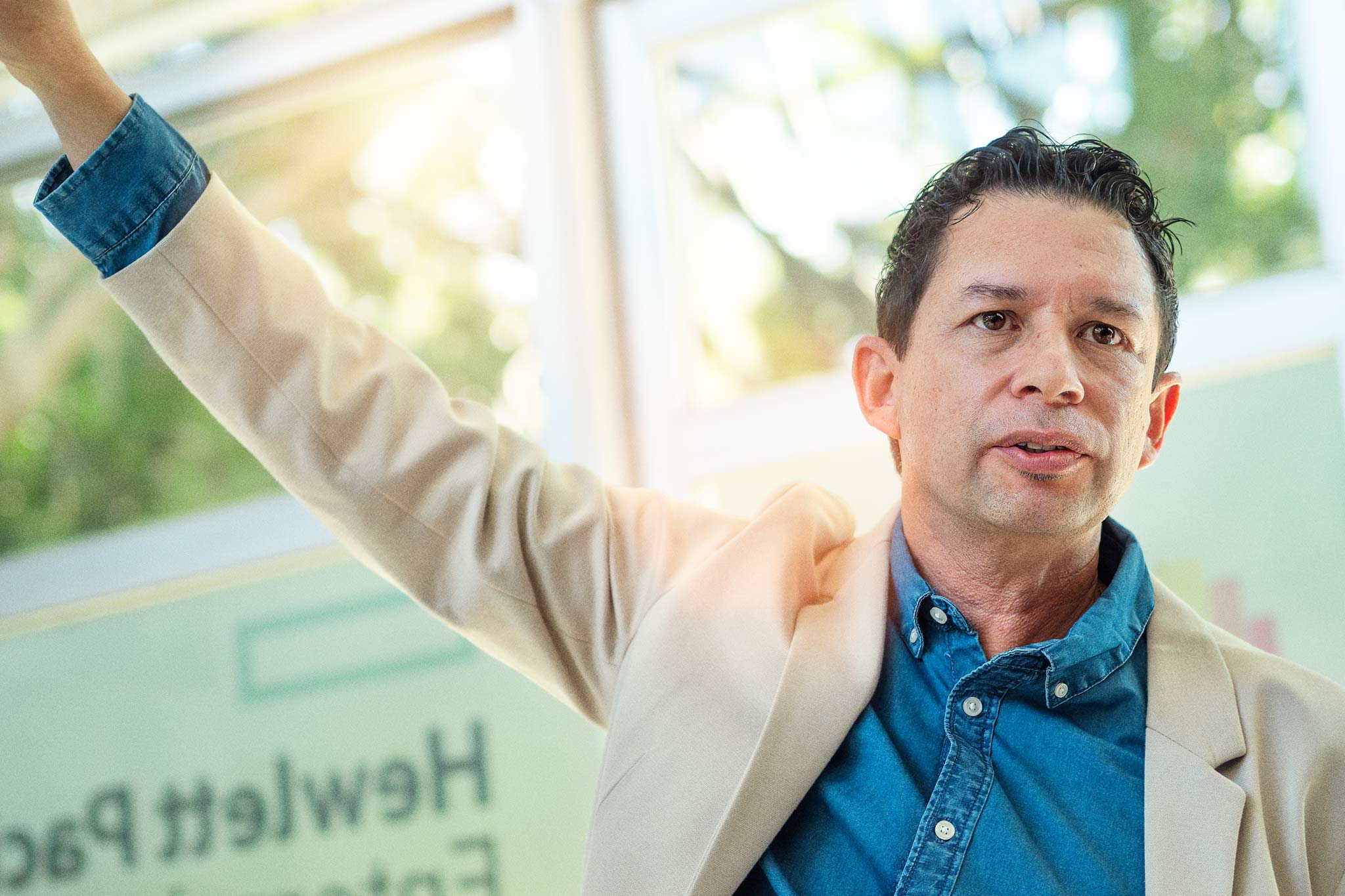Ever since April 2014, Dr Victor M Larios has been the Smart Cities Innovation Center (SCIC) Director at the University of Guadalajara, Mexico, where he leads a group of researchers in Smart Cities and Information Technologies. Also, he is a Professor at the Information Systems Department at the same university and one of the ambassadors in the Guadalajara Convention Bureau’s Ambassador Program.
The innovation centre is a think-thank to help government, industry, and other academic partners to join efforts to improve the quality of life and social wellbeing within an urban environment by using technology as the core driver for transformation.
Victor M Larios’ primary research interests are Smart Cities, IoT Distributed Systems, Networking, Multiagent Systems, and Data Visualisation using Virtual Reality. He has ongoing collaborations in projects with the High Technology industry and government, using design thinking and agile methodologies to accelerate technology transfer in living labs.
As an entrepreneur, Victor M Larios is the founder and Chief Information Officer (CIO) of the consulting company, Institute for the Development and Innovation in Smart Cities (IDI Smart Cities), which collaborates with Advion Solutions in Finland.
Its main activities are market research, promoting scholarships to develop local talent, and supporting international projects in Latin American countries and the European Union. One of its key efforts is to introduce the Circular Economic Model as a sustainability component for megacities, namely, the number of cities with over ten million people.
As a volunteer, Victor M Larios technically leads the Guadalajara smart city project for the Government, and international non-governmental organisations, such as the IEEE, which stands for the Institute of Electrical and Electronics Engineers.
He has worked with Joel Myers, Chair of IEEE IoT Initiative for Smart Cities, for four years to develop the “Internet of People” (IoP). It is a people-centric approach to connecting people within cities to build opportunities and growth on a business and social level.
In March 2020, the first IoP pilot project was launched by the Mexican State Government of Jalisco to support and incentivise local economies and communities in recovering from the Covid-19 pandemic through the IoP cloud/mobile platform and a pioneering digital micro-currency called Hoozie.
Victor M Larios highlights some of the most important questions for Smart Cities in Guadalajara:
“We must understand that Smart Cities projects are one ecosystem integrating industry, government, citizens (over associations), and academy. For each particular challenge in a smart city, we need to see the opportunity of developing local innovation connected to what is already developed and succeed in other cities.
“We need to be pragmatic and create events helping decision takers build the best strategies for cities”
“The first question will be, among all the projects doing a balance at one year ending this Government administration, what is the balance among smart city projects and lessons learned to be shared? And the second question is, how do we better integrate our smart city ecosystem and connection outside to deal with the current challenges in the city?
“The second question is based on the understanding that Smart Cities are never achieved, and any achievement produces new requirements to connect solutions to the city’s different areas of services and infrastructures.”
Guadalajara is a metropolitan area with nine integrated municipalities. On June 24th, there are elections for the State Government and city administrations. A municipal administration lasts three years, and a state level has six years.
The mission of Growth Management Services (GMS) is to assist and guide local governments, state agencies, and others to manage growth and development, consistent with the Growth Management Act (GMA). The GMA was adopted to address ways to accommodate growth. The fastest-growing cities and counties must complete comprehensive plans and development regulations to guide future growth.
“In the last ten years, multiple investments for the GMA Smart City have passed, but still, there is a need for better ecosystem integration. Most of the funding is based on the Government, even since 2018 providing manual grants for research and local innovation for the smart city development.”
Victor M Larios says that even if the applied research grants were modest compared with other investments in technological projects from the State Government, they are an excellent practice to keep on the local innovation in transformación in the ecosystem. Traditional projects in the Growth Management Act were related to mobility, internet connectivity, healthcare, education, security, climate change mitigation, water, and energy management.
Since 2015, Imeplan, as a decentralised government office, has been funded to coordinate projects, public policies, and actions equally in all municipalities connected in the GMA. Open data was one of the main goals and continued the tasks of this initiative. As a result, in 2021, the manifesto for urban development in GMA was recognised by the United Nations as one of the five best city initiatives in the world in that year.
“We must state that GMA has a mature ecosystem of more than 600 companies dedicated to high-technology activities with very active industry chambers in contact with the Government and academia. Besides, GMA is an important educational hub with more than 20 universities, private and public, holding over 400,000 students.”
The University of Guadalajara is Mexico’s second-largest high education institution, with 329,641 students, 17,800 professors, and 2,779 researchers. That allows for pushing for a solid local ecosystem with many international connections to support it.
“However, for the size of the ecosystem, it’s hard to connect all stakeholders effectively.”
How important is developing business events in Guadalajara for Smart Cities as an organisation and the university?
“It’s critical because the business models for Smart Cities are evolving, and the Government is not the only source of investment. With the promise of achieving solutions for cities driving their citizens to a better quality of life, many innovations, successful projects, and lessons learned are critical for Growth Management Act in other cities in Mexico and Latin America.
“We have no choice and not much time to become more sustainable in all our processes and styles of life if we want to have a future”
“We are moving from an era when big centralised infrastructures and engineering projects could solve most of the problems of cities. With the rapid urbanisation and vertical growth of cities’ land use, in cities with more than one million inhabitants, GMA is reaching almost six million, the need for decentralised solutions offers more resiliency and the ability to scale up.”
For example, to purify water in the city, the metropolitan area invested in a significant infrastructure in the past. However, with the fast urban development, moving the dark waters to only one point in the city is complex and costly. Hence, the new projects are more decentralised.
“Business events in Smart Cities allow for sharing and innovation in new processes and strategies by maintaining the economic sustainability of projects. Also, business events are essential to share experiences and create alliances among cities. For the universities, we need to place new educational requirements for the talent-facing cities projects. Smart Cities events are also a way to connect as part of the ecosystem.”
Victor M Larios says the universities realise they are natural drivers for events and meetings related to Smart Cities. In agreements with other universities worldwide, they create the flow of human resources ready to work in innovative city projects from all required fields.
Since Smart Cities are multidisciplinary, there is a need to train the talent to work in teams with the industry and government to get feedback on current challenges and use cases that can work.
“University facilities, with laboratories and auditoriums, become neutral spaces where event companies outside the campus are competitors. They can talk together to face common challenges in universities and even collaborate in programmes that benefit both parties.”
The Jalisco State Government has a ministry dedicated to innovation and technology to support the high-tech ecosystem since it represents a crucial economic sector.
This ministry connects to all other ministries and governmental offices to detect challenges and organise forums or meetings to help. Sometimes, municipal authorities are from a different party than the State Government. Still, thanks to the decentralised Office of Imeplan and the support of the various chambers of industry in the high technology sector, they converge and add from their side.
The main difference is related to budgets at the Jalisco State and municipalities; however, when there is sponsorship from industry to be involved in city projects, that can help to focus on organising events or workshops for the local ecosystem.
“For example, Guadalajara municipality is in the metropolis’s downtown; its main activity is related to tourism and services. However, surrounding Guadalajara, we have Zapopan, which has, like other municipalities, most of the high technology industry as its main activity, and that makes a difference in complementing Guadalajara activities.”
The answer to the question of which strategic question is the most important at the moment, Victor M Larios says:
“With all the significant changes coming to improve cities, how Guadalajara Metropolitan Area Smart City Ecosystem is ready to face them correctly and learn from early adopters’ experiences.
“We are speaking, for example, about artificial intelligence, where with products such as ChatGPT, many services in the city can be improved. We also need to rethink all the jobs that could be replaced and where we can create new opportunities for those people losing their current jobs.
“We have a responsibility to help other cities share our good practices”
“And also became pragmatic with implementations, adoptions, and tropicalisation of technology to create and share our experience with the rest of Latin America. Or another example with the Digital Twins and its value for the industry, tourism, and being ready for the metaverses and all opportunities they are promising as a new step to access the internet and technology.”
Sustainability is one of the leading concerns when it comes to business events. What kind of initiatives can Victor M Larios take as a leader of Smart Cities?
“We are working on educating leaders for Circular Economies, and this year, we are visiting the SITRA World Circular Economies Forum to get insights. With the climate change in the world and accelerated urbanisation, we have no choice and not much time to become more sustainable in all our processes and styles of life if we want to have a future.
“Events are essential, and we must create a local culture for sustainability. In Mexico, having successful cases, other cities will also move to Latin America. Multidisciplinary work is necessary, and all the ecosystems must be integrated for sustainability to create our path.”
Victor M Larios’s duties are facing some challenges. One of them is the current political situation.
“For particular reasons, the national science council is changing with current political situations. Also, locally, the State of Jalisco is closing its administration this year.
“Elections at the federal and state levels are coming in 2024, and we must secure that new candidates’ agendas will prioritise Smart Cities and sustainability. Also, we need some continuity to projects.”
For that, they are working as a think-tank at the university to help publish tangible smart city projects with local, national, and international experts on topics that the city needs to focus as water, transport, energy, education, healthcare, etcetera.
For the future, Victor M Larios says they are looking to strengthen the forthcoming government administration’s vision and roadmap for the Smart Cities projects with social impact and help the local industry evolve with the projects in new business models.
“Events such as workshops can help to produce those ecosystem roadmaps. But most important is continuity for achievements, new technology adoptions, and future critical investments in Smart Cities and their potential return in social and economic perspectives.
“Many cities in Latin America follows Guadalajara, so we have a responsibility to help other cities share our good practices. We use IEEE conferences and events, but we probably need to be more active in events for standards, participate in them, and create new alliances where we can contribute and learn to grow.
“Since the Smart Cities Innovation Centre is supposed to be a think-thank, we need to work harder for local publications and be pragmatic and create events helping decision takers build the best strategies for cities. And we are transversal with our core Information Technologies team but open to collaborating on a multidisciplinary level on each challenge that cities can face today.”



